Neighbor Noise Complaint Letter
[Your Name]
[Your Address]
[City, State, ZIP Code]
[Email Address]
[Phone Number]
[Date]
[Neighbor's Name]
[Neighbor's Address]
[City, State, ZIP Code]
Subject: Noise Complaint
Dear [Neighbor's Name],
I hope this letter finds you well. I am writing to address a concern that has been affecting my quality of life and the peaceful enjoyment of my property. Over the past few weeks, I have been experiencing persistent and disruptive noise coming from your residence during various hours of the day and night.
I understand that living in close proximity to one another requires a certain level of tolerance and consideration for each other's comfort. While I respect your right to enjoy your home and engage in activities that might generate noise, the excessive volume and duration of the disturbances have been causing a considerable amount of inconvenience for me and potentially other neighbors as well.
I kindly request that we work together to find a suitable solution to this issue. It is important for both of us to maintain a harmonious living environment within our community. To that end, I would like to propose a few possible solutions that could help alleviate the noise concerns:
1. Adjusting Noise-Generating Activities: If the noise is primarily generated by specific activities such as playing loud music, using power tools, or hosting gatherings, we could discuss setting specific hours during which these activities could take place or limiting the volume during certain times of day.
2. Soundproofing Measures: Installing soundproofing materials or taking steps to minimize noise transmission could be an effective way to reduce the impact of the noise on neighboring properties.
3. Open Communication: I believe that open and respectful communication is key to resolving this matter amicably. We could establish a line of communication to promptly address any noise-related concerns and find mutually agreeable solutions.
4. Local Noise Ordinances: It might be helpful to review the local noise ordinances and regulations set by our city or homeowners' association. Adhering to these guidelines can contribute to a more peaceful living environment for everyone.
I genuinely hope we can find a resolution that works for both of us and allows us to coexist harmoniously as neighbors. Please feel free to reach out to me at [your phone number] or [your email address] to discuss this matter further or to share your thoughts on the proposed solutions.
Thank you for your understanding and consideration. I look forward to hearing from you and working together to create a more peaceful living environment for all.
Sincerely,
[Your Name]
[Your Signature if sending a physical letter]
Formal Noise Complaint Letter to Neighbor
Subject: Noise Disturbance Concern
Dear [Neighbor's Name],
I hope this letter finds you well. I am writing to bring to your attention a matter that has been affecting my quality of life at [Your Address].
Over the past [timeframe], I have experienced significant noise disturbances coming from your residence, particularly [describe noise: loud music, barking dogs, parties, construction work, etc.]. These disturbances typically occur [specify times/days], often extending into late evening/early morning hours.
The noise levels have made it difficult for me/my family to [sleep, work from home, study, relax, etc.], and I believe this may be in violation of our community's quiet hours, which are established from [time] to [time].
I value our neighborly relationship and am confident this matter can be resolved amicably. I would appreciate it if you could take steps to reduce the noise levels, particularly during [specific times].
If you would like to discuss this matter further or if there are circumstances I should be aware of, please feel free to contact me at [phone number] or [email address].
Thank you for your understanding and cooperation.
Sincerely,
[Your Name]
[Your Address]
[Date]
Friendly Initial Noise Complaint Message
Subject: Quick Note About Noise
Hi [Neighbor's Name],
Hope you're doing well! I wanted to reach out about something minor that I thought we could easily work out together.
I've noticed some noise coming from your place lately, especially [describe situation]. I totally understand that life happens and sometimes things get loud – no judgment at all!
The thing is, it's been making it a bit tough for me to [sleep/work/concentrate] during [specific times]. I'm sure you weren't aware it was carrying over, so I thought I'd just give you a heads up.
Would it be possible to keep things a bit quieter during [timeframe]? I'd really appreciate it, and I'm happy to do the same for you!
Thanks so much for understanding. Feel free to text or call me anytime at [number] if you want to chat about it.
Best,
[Your Name]
Second Follow-Up Noise Complaint Letter
Subject: Follow-Up: Ongoing Noise Disturbance
Dear [Neighbor's Name],
I am writing to follow up on my previous communication dated [date] regarding noise disturbances from your residence at [address].
Unfortunately, the noise issues have continued and, in some instances, have intensified. Specifically, I have documented the following incidents: [list dates, times, and nature of disturbances].
I had hoped we could resolve this matter neighborly without involving third parties. However, the persistent nature of these disturbances has significantly impacted my household's wellbeing and our right to peaceful enjoyment of our property.
I am requesting that immediate action be taken to address this situation. If the noise continues, I will have no choice but to file a formal complaint with [homeowners association/property management/local authorities].
I remain open to discussing a resolution. Please contact me within [3-5 business days] at [contact information].
Respectfully,
[Your Name]
[Your Address]
[Date]
Noise Complaint Letter for Barking Dogs
Subject: Concern Regarding Dog Barking
Dear [Neighbor's Name],
I hope this message finds you and your furry friend well. I'm reaching out to discuss a concern regarding your dog's barking.
I'm a dog lover myself and understand that barking is natural behavior. However, your dog has been barking continuously for extended periods, particularly when left alone during [timeframe]. This typically occurs [describe pattern: weekdays during work hours, evenings, early mornings, etc.].
The persistent barking has been disruptive to my household, affecting our ability to [work from home, sleep, enjoy our outdoor space, etc.]. I'm concerned your dog may be experiencing distress or anxiety when alone.
I wanted to bring this to your attention as you may not be fully aware of the extent of the barking while you're away. Perhaps addressing any underlying anxiety or adjusting the dog's routine could help both our situations.
I'm confident we can find a solution that works for everyone, including your pet. Please let me know if you'd like to discuss this further.
Thank you for your consideration.
Best regards,
[Your Name]
[Contact Information]
Noise Complaint Letter for Late-Night Parties
Subject: Request Regarding Late-Night Gatherings
Dear [Neighbor's Name],
I hope you're well. I'm writing to address an issue concerning noise from gatherings at your residence.
I completely understand the desire to entertain friends and celebrate occasions – I enjoy hosting guests myself. However, your recent parties have extended well past midnight with high noise levels that carry into my home, making it impossible for my family to sleep.
Specifically, the events on [list dates] continued until [times] with loud music, voices, and activity. Our community guidelines specify quiet hours from [time] to [time], and these gatherings have consistently exceeded reasonable noise levels during these protected hours.
I'm not asking you to stop entertaining, but I would greatly appreciate it if you could:
- Keep music and noise at moderate levels after [time]
- Consider moving gatherings indoors after [time]
- Inform me in advance of planned events so I can prepare accordingly
A little advance notice and consideration would go a long way. I'm happy to extend the same courtesy should I host any events.
Thank you for being mindful of our shared living environment.
Sincerely,
[Your Name]
Noise Complaint Letter to Landlord About Neighbor
Subject: Formal Noise Complaint - Unit [Number]
Dear [Landlord/Property Manager Name],
I am writing to file a formal noise complaint regarding the tenant in Unit [Number] at [Property Address].
As a tenant at [Your Unit Number] since [date], I have consistently experienced excessive noise disturbances from the above-mentioned unit. Despite my attempts to resolve this matter directly with the neighbor on [dates of attempts], the situation has not improved.
The disturbances include: [detailed description of noise types, frequency, duration, and times]. These incidents have occurred on the following dates: [list specific dates and times with descriptions].
This ongoing situation violates the quiet enjoyment clause in my lease agreement and potentially breaches the lease terms of the offending tenant. The noise has negatively impacted my [sleep, work productivity, health, etc.].
I am requesting that you take immediate action to address this matter with the tenant in question. I have documented these incidents with [recordings, written logs, witness statements] and am prepared to provide this evidence if needed.
Please inform me of the steps you will take to resolve this situation within [timeframe]. I value my tenancy here and hope this matter can be resolved promptly without further escalation.
Thank you for your attention to this serious matter.
Sincerely,
[Your Name]
[Your Unit Number]
[Contact Information]
[Date]
Cc: [Building Management/HOA if applicable]
Noise Complaint Letter for Construction/Renovation Work
Subject: Concern Regarding Construction Noise
Dear [Neighbor's Name],
I hope your renovation project is progressing well. I'm writing to discuss the impact of the construction work being conducted at your property.
I understand that home improvements are sometimes necessary and that construction noise is unavoidable. However, the work has been occurring [describe schedule: starting very early, extending late into evening, on weekends, etc.], which exceeds the permitted construction hours in our area of [permitted hours].
The noise levels from [hammering, drilling, heavy machinery, etc.] have been substantial and have affected my ability to [work from home, care for young children/elderly family members, maintain reasonable peace in my home].
I would appreciate if you could:
- Ensure work is conducted only during permitted hours: [specify local regulations]
- Provide advance notice of particularly noisy work days
- Communicate an estimated completion timeline
I recognize that renovations are temporary, and I'm willing to be accommodating if I'm kept informed of the schedule and duration.
Thank you for your understanding and cooperation.
Best regards,
[Your Name]
[Contact Information]
Anonymous Noise Complaint Letter
Subject: Noise Disturbance Concern
To the Resident of [Address],
This letter is to inform you of ongoing noise disturbances originating from your residence that are affecting neighbors in the surrounding area.
The disturbances have been observed during the following times and dates: [provide specific information without revealing your exact location]. The noise includes [describe type of noise] and has been occurring [frequency pattern].
Local noise ordinances in our area prohibit excessive noise during [quiet hours], and the current levels appear to exceed these regulations. Multiple residents have been impacted by these disturbances.
We kindly request that you take immediate steps to reduce noise levels, particularly during evening and early morning hours. Being mindful of neighbors contributes to a positive community environment for everyone.
If the disturbances continue, residents may have no choice but to file formal complaints with local authorities or the homeowners association.
Thank you for your cooperation and understanding.
Concerned Neighbors
What is a Neighbor Noise Complaint Letter and Why Send One
A neighbor noise complaint letter is a formal or informal written communication addressed to a neighbor whose activities are generating excessive or disruptive noise. The primary purposes include:
- Documenting the issue: Creates a written record of the disturbance and your attempt to resolve it
- Opening dialogue: Initiates a conversation about the problem in a non-confrontational way
- Requesting resolution: Clearly communicates your need for the noise to be reduced or stopped
- Legal protection: Establishes a paper trail that may be necessary for future legal action or complaints to authorities
- Maintaining relationships: Allows you to address the issue professionally while preserving neighborly relations
- Avoiding escalation: Provides an opportunity to resolve the matter privately before involving landlords, HOAs, or law enforcement
When Should You Send a Neighbor Noise Complaint Letter
Consider sending a noise complaint letter in these situations:
- Repeated disturbances: The noise has occurred multiple times and shows a pattern
- Verbal attempts failed: You've tried speaking to the neighbor directly without success
- Excessive volume: The noise significantly exceeds normal residential levels
- Violation of quiet hours: Disturbances occur during legally protected quiet times (typically 10 PM - 7 AM)
- Impact on daily life: The noise affects your sleep, work, health, or quality of life
- Long duration: Noise continues for extended periods without reasonable breaks
- Before official complaints: You want to address the issue privately before contacting authorities
- Tenant situations: When you need documentation for landlord or property management intervention
- HOA violations: The noise violates community covenants or rules
- Special circumstances: You have family members who are particularly vulnerable (infants, elderly, ill, or working night shifts)
Who Should Send a Neighbor Noise Complaint Letter
The letter should come from:
- Direct complainant: The person most affected by the noise should send the letter
- Primary householder: The person whose name is on the lease or property deed has the most authority
- Multiple residents: Several neighbors can co-sign a letter to demonstrate widespread impact
- Tenant to tenant: When both parties rent from the same landlord
- Homeowner to homeowner: Direct communication between property owners
- Through property management: Tenants should sometimes route complaints through their landlord
- HOA representative: In communities with homeowners associations, the HOA may send official notices
- Legal representative: In severe cases, an attorney may send a cease and desist letter
To Whom Should the Letter Be Addressed
The recipient depends on your situation:
- Direct neighbor: First attempt should typically go to the person causing the noise
- Property owner: If the noisy neighbor is a tenant, you may need to contact their landlord
- Landlord/Property manager: When both you and the noise-maker are tenants in the same building
- HOA board: In communities with homeowners associations that enforce noise regulations
- Building management: For apartment complexes or condominiums with on-site management
- Co-op board: In cooperative housing situations
- Multiple parties: Send copies to both the neighbor and property management for serious issues
- Legal authorities: Police or code enforcement should only receive complaints after other methods fail
How to Write and Send a Neighbor Noise Complaint Letter
Follow these steps for effective communication:
- Document first: Keep a detailed log of noise incidents (dates, times, duration, type of noise) for at least 1-2 weeks
- Start friendly: Your first letter should be cordial and assume the neighbor is unaware of the problem
- Be specific: Include concrete details about when and what type of noise is occurring
- Reference standards: Mention relevant quiet hours, lease terms, or community rules
- State impact: Explain how the noise affects you without being overly emotional
- Suggest solutions: Offer reasonable compromises or request specific changes
- Provide contact info: Make it easy for the neighbor to respond and discuss
- Choose delivery method: Hand-deliver, send via certified mail, or email depending on the situation
- Keep copies: Maintain records of all correspondence for potential future need
- Set expectations: Give reasonable timeframes for response and improvement
- Escalate gradually: Start informal, then move to formal letters if needed
Requirements and Preparations Before Sending the Letter
Complete these steps before writing:
- Verify the source: Ensure you've correctly identified where the noise is coming from
- Know the rules: Research local noise ordinances, quiet hours, and community regulations
- Review your lease/HOA documents: Understand what policies govern noise in your living situation
- Document thoroughly: Create a detailed log with dates, times, duration, and descriptions
- Gather evidence: Take video or audio recordings if possible (check local recording laws)
- Attempt direct communication: Try speaking to the neighbor first in non-confrontational manner
- Check for special circumstances: Consider whether there are temporary situations (new baby, illness, short-term construction)
- Consult with other neighbors: Determine if others are affected to strengthen your case
- Understand your rights: Know what constitutes reasonable vs. unreasonable noise
- Identify the decision-maker: Determine whether to contact the neighbor, landlord, or HOA
Letter Formatting and Style Guidelines
Optimize your letter's effectiveness with proper formatting:
- Length: Keep it concise – one page is ideal, no more than two pages
- Tone: Start friendly and cordial; become firmer only in follow-up letters
- Format: Use business letter format for formal complaints; email format for casual initial contact
- Specificity: Include exact dates, times, and descriptions rather than vague complaints
- Professional language: Avoid emotional language, insults, or threats
- Clear structure: Use paragraphs with introduction, details, impact statement, request, and closing
- Evidence references: Mention that you have documentation without attaching it initially
- Contact information: Always include multiple ways to reach you
- Delivery method: Certified mail for formal complaints; hand delivery or email for friendly approaches
- Timing: Send during reasonable hours, not immediately after a noise incident when emotions are high
- Copies: Keep records and send copies to landlords/management when appropriate
What to Do After Sending the Letter
Follow these post-sending steps:
- Wait for response: Allow 3-7 days for the neighbor to respond and take action
- Continue documenting: Keep recording incidents even after sending the letter
- Monitor improvement: Note any positive changes or continued problems
- Send acknowledgment: If the neighbor responds positively, thank them for their cooperation
- Send follow-up: If no improvement occurs within reasonable time, send a second, firmer letter
- Escalate appropriately: Contact landlord, HOA, or authorities if the problem persists
- Maintain civility: Continue being polite even if frustrated
- Keep copies organized: File all correspondence chronologically for potential legal need
- Inform property management: Update your landlord or HOA about outcomes
- Consider mediation: Use community mediation services if direct communication fails
- File official complaints: Report to police or code enforcement only after documented attempts to resolve privately
- Consult attorney: Seek legal advice if the situation becomes severe or threatening
Advantages and Disadvantages of Sending a Noise Complaint Letter
Advantages:
- Creates official documentation of the problem and your attempts to resolve it
- Less confrontational than face-to-face discussions for some personalities
- Provides clear, organized information about the issue
- Gives the neighbor time to process and respond thoughtfully
- Establishes a paper trail for landlords, HOAs, or legal proceedings
- Allows you to be specific about times, dates, and impacts
- Can be sent anonymously if necessary for safety concerns
- Shows good faith effort to resolve issues before involving authorities
Disadvantages:
- May damage neighborly relationships or create tension
- Can seem impersonal or overly formal for minor issues
- Takes more time than a quick conversation
- May escalate the situation if the neighbor reacts defensively
- Doesn't guarantee any action or improvement
- Can be misunderstood without tone of voice and body language
- May lead to retaliation from difficult neighbors
- Creates a formal record that could affect future property transactions
Comparing Noise Complaint Letters to Alternative Approaches
Letter vs. Direct Conversation:
- Letters provide documentation; conversations are faster and more personal
- Letters avoid immediate confrontation; conversations allow real-time dialogue
- Letters can be carefully worded; conversations risk emotional reactions
Letter vs. Official Complaint:
- Letters preserve neighborly relations; official complaints create adversarial relationships
- Letters are private; official complaints involve third parties
- Letters show good faith; complaints demonstrate you've exhausted other options
Letter vs. Mediation:
- Letters are one-way communication; mediation involves facilitated dialogue
- Letters are free and immediate; mediation requires scheduling and possibly costs
- Letters may resolve simple issues; mediation better for complex or ongoing problems
Letter vs. Ignoring the Problem:
- Letters create records; ignoring preserves peace temporarily but allows problems to continue
- Letters may resolve issues; ignoring can lead to resentment and health impacts
Anonymous vs. Signed Letters:
- Anonymous letters protect identity but carry less weight and prevent dialogue
- Signed letters build accountability but may create uncomfortable future interactions
Essential Tips and Best Practices
- Start with empathy: Assume your neighbor isn't aware of the problem rather than being intentionally disruptive
- Use "I" statements: Focus on your experience ("I'm having difficulty sleeping") rather than accusations ("You're too loud")
- Be a good neighbor first: Make sure you're not creating noise issues yourself before complaining
- Time it right: Don't send the letter immediately after an incident; wait until you're calm and can be objective
- Offer flexibility: Acknowledge that some noise is inevitable and you're requesting reasonable accommodation
- Build rapport first: If possible, establish a positive relationship before raising complaints
- Know your limits: Understand the difference between unreasonable noise and normal living sounds
- Consider cultural differences: Some cultures have different norms about noise and social interaction
- Use certified mail for important letters: Proof of delivery may be necessary for landlord or legal purposes
- Stay factual: Avoid exaggeration or emotional language that could undermine your credibility
- Propose solutions: Suggest specific compromises like time limits or advance notice for events
- Follow the escalation ladder: Start friendly, then formal, then involve authorities only as a last resort
Common Mistakes to Avoid
- Waiting too long: Address issues early before resentment builds and problems become entrenched
- Being vague: General complaints like "you're too loud" are less effective than specific incidents with dates and times
- Threatening immediately: Don't mention lawyers or police in initial letters; save escalation for persistent problems
- Getting emotional: Angry or dramatic language reduces credibility and may provoke defensiveness
- Making demands: Request cooperation rather than issuing ultimatums in early communications
- Not documenting: Failing to keep records of incidents and correspondence weakens your position
- Sending anonymous first letters: Anonymous complaints prevent dialogue; use them only when safety is a concern
- Comparing to others: Saying "other neighbors don't make noise" sounds judgmental; focus on your experience
- Exaggerating: Overstating problems damages credibility if the situation is investigated
- Forgetting to follow up: If you send a letter, be prepared to take next steps if ignored
- Being inconsistent: Don't complain about noise if you create similar disturbances
- Skipping direct contact: Unless safety is an issue, try speaking to the neighbor before sending formal letters
- Not knowing the law: Complaining about legally permitted activities (like daytime construction) weakens your case
Key Elements and Structure of an Effective Letter
Include these components:
- Subject line: Clear, specific heading that identifies the purpose (for emails or formal letters)
- Proper greeting: Use the neighbor's name if known; "Dear Neighbor" if not
- Opening statement: Brief, polite introduction that sets a cooperative tone
- Problem description: Specific details about the noise including type, frequency, times, and dates
- Impact statement: Explain how the noise affects you without being dramatic
- Reference to standards: Mention relevant quiet hours, lease terms, or community rules
- Request for action: Clearly state what you're asking the neighbor to do
- Solution suggestions: Offer reasonable compromises or specific changes
- Contact information: Provide multiple ways for the neighbor to respond
- Closing statement: End with appreciation for their consideration and cooperation
- Your signature and date: Essential for formal documentation
- Attachments reference: Mention if you have additional documentation (but don't include in first letter)
- CC line: Note if copies are being sent to landlords or management (when appropriate)
Frequently Asked Questions
Should I talk to my neighbor before sending a letter? Yes, in most cases a friendly conversation should be your first step unless you have safety concerns or previous negative interactions.
How many noise incidents should I document before complaining? Document at least 3-5 incidents over a 1-2 week period to establish a pattern rather than isolated events.
Can I send an anonymous noise complaint letter? Yes, but anonymous letters carry less weight and prevent productive dialogue. Use anonymity only when necessary for safety.
What if my neighbor retaliates after I send a letter? Document any retaliatory behavior immediately and report it to your landlord, HOA, or police if it involves harassment or threats.
How long should I wait for a response? Allow 5-7 days for the neighbor to respond and show improvement before taking further action.
Should I record the noise as evidence? Yes, audio or video recordings can be valuable, but check your local laws regarding recording without consent.
What if the noise is coming from a rental property? Contact both the tenant and the landlord, as landlords have a legal responsibility to address tenant disturbances.
Can I complain about daytime noise? Yes, if it's excessive, but your case is weaker during normal hours. Focus on unreasonable volume or duration.
Will sending a letter hurt my relationship with my neighbor? It might create some tension, but a well-written, respectful letter is better than harboring resentment or calling authorities without warning.

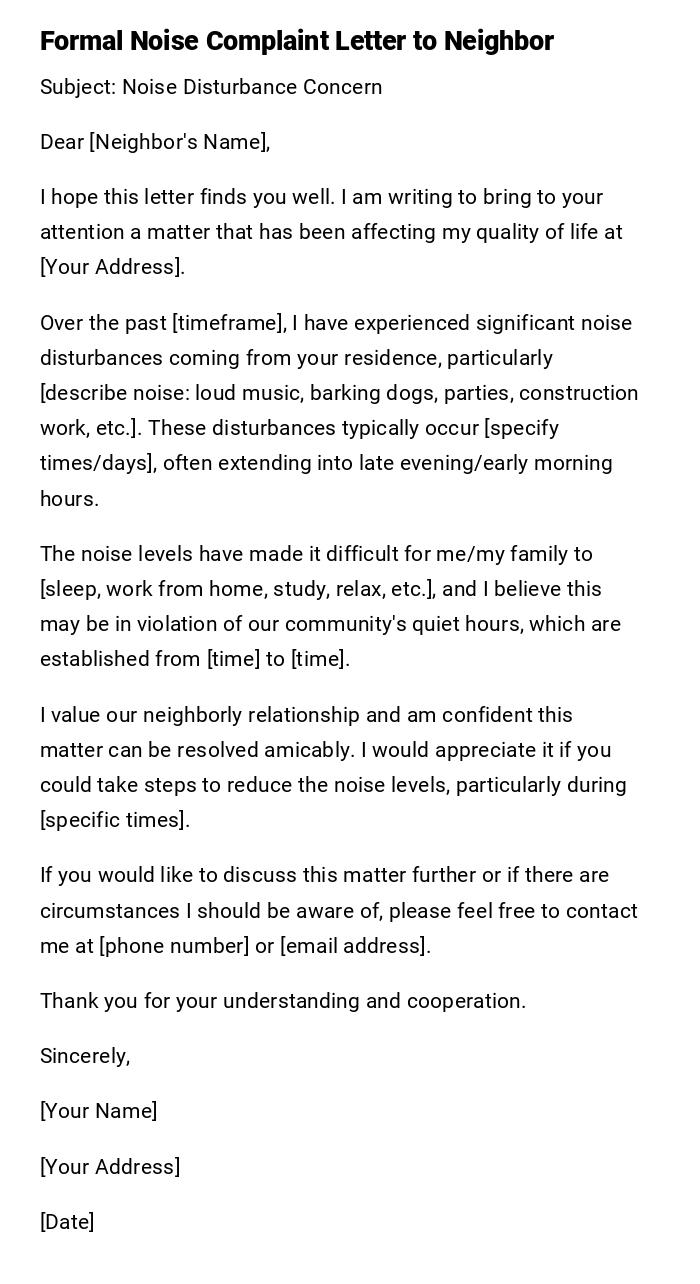
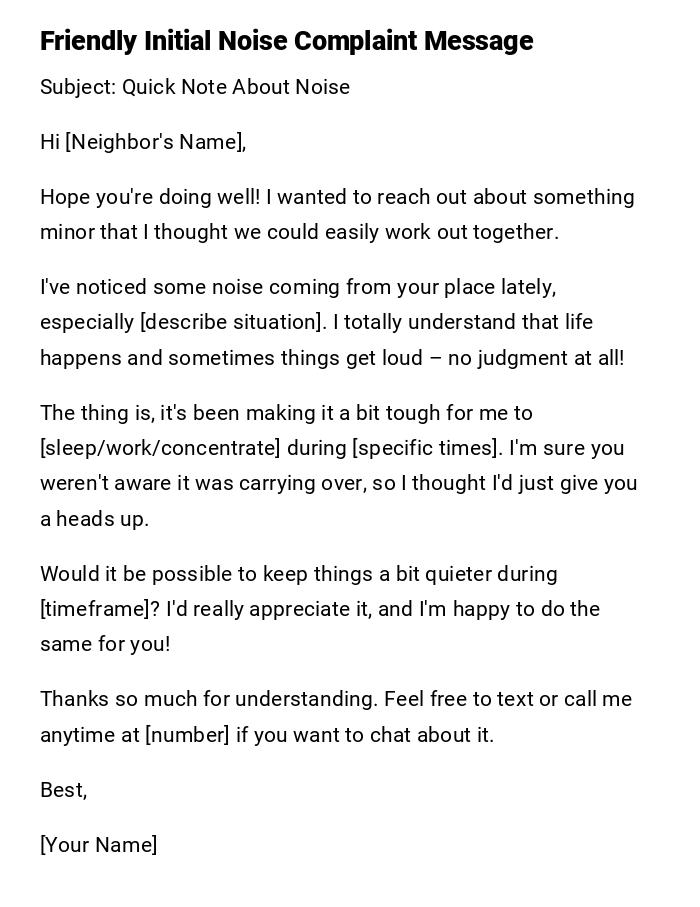
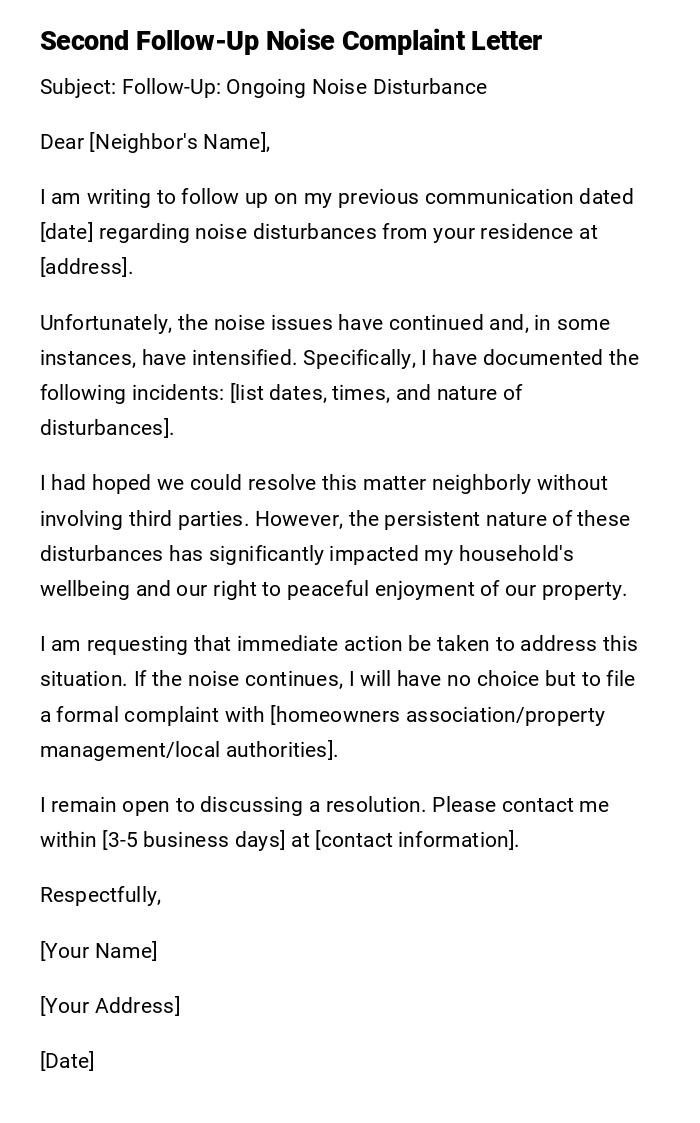
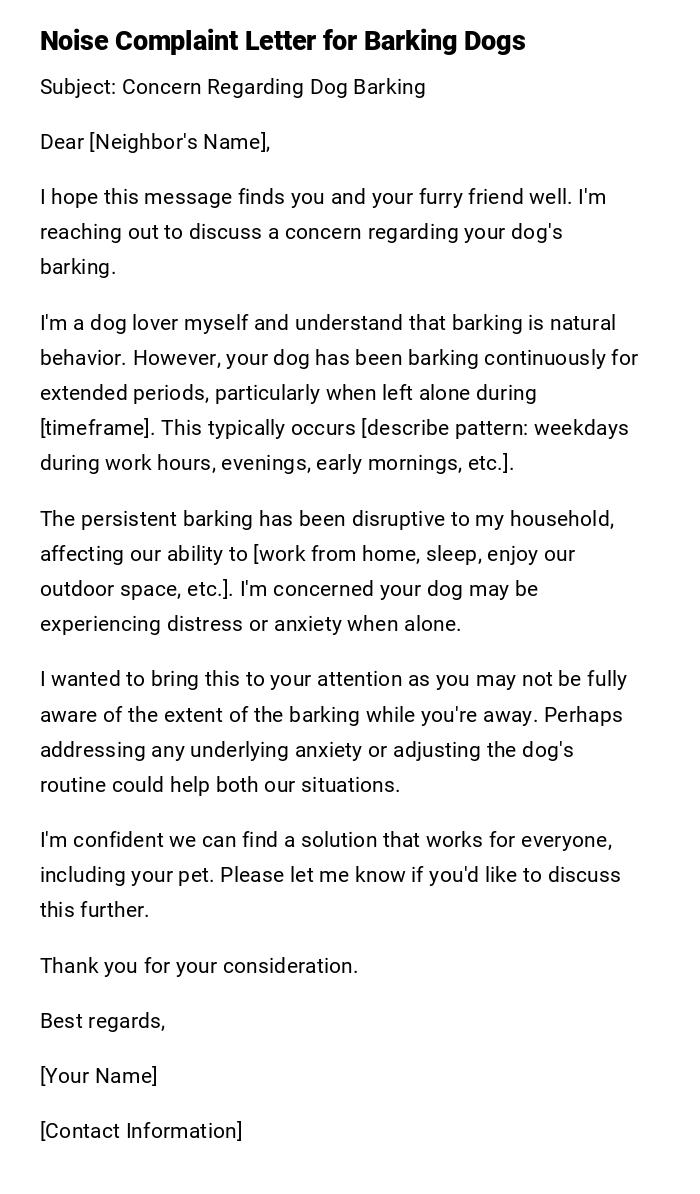
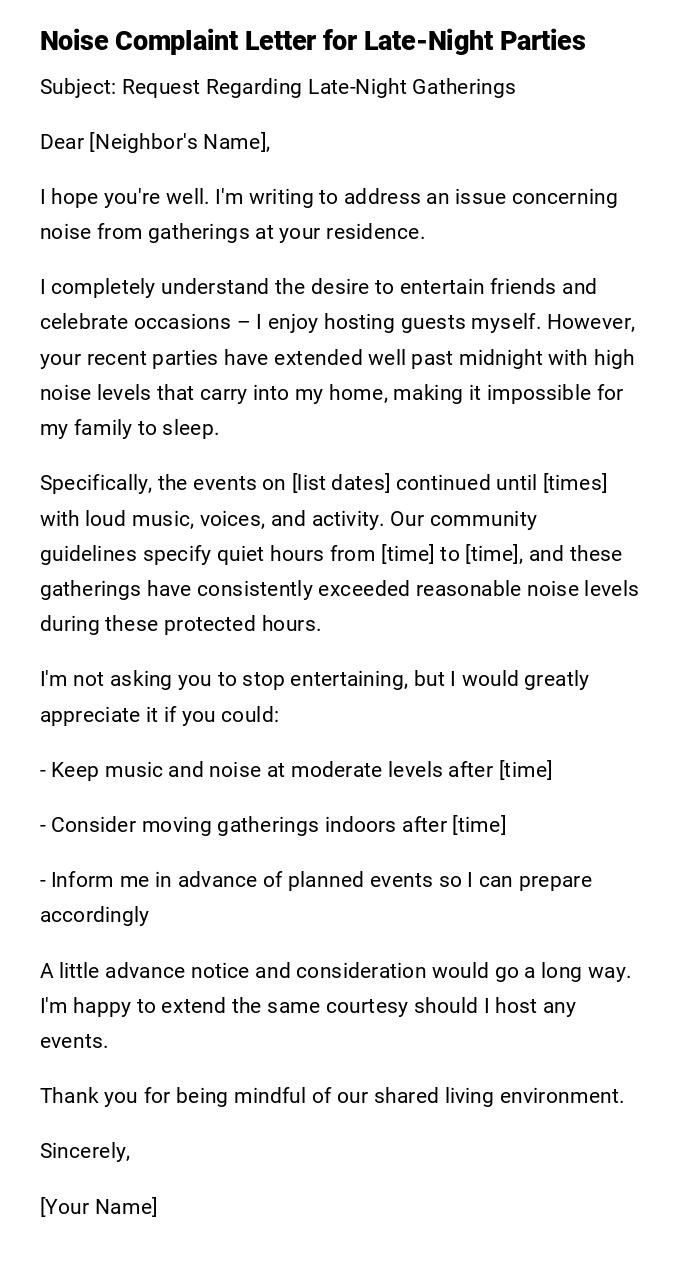
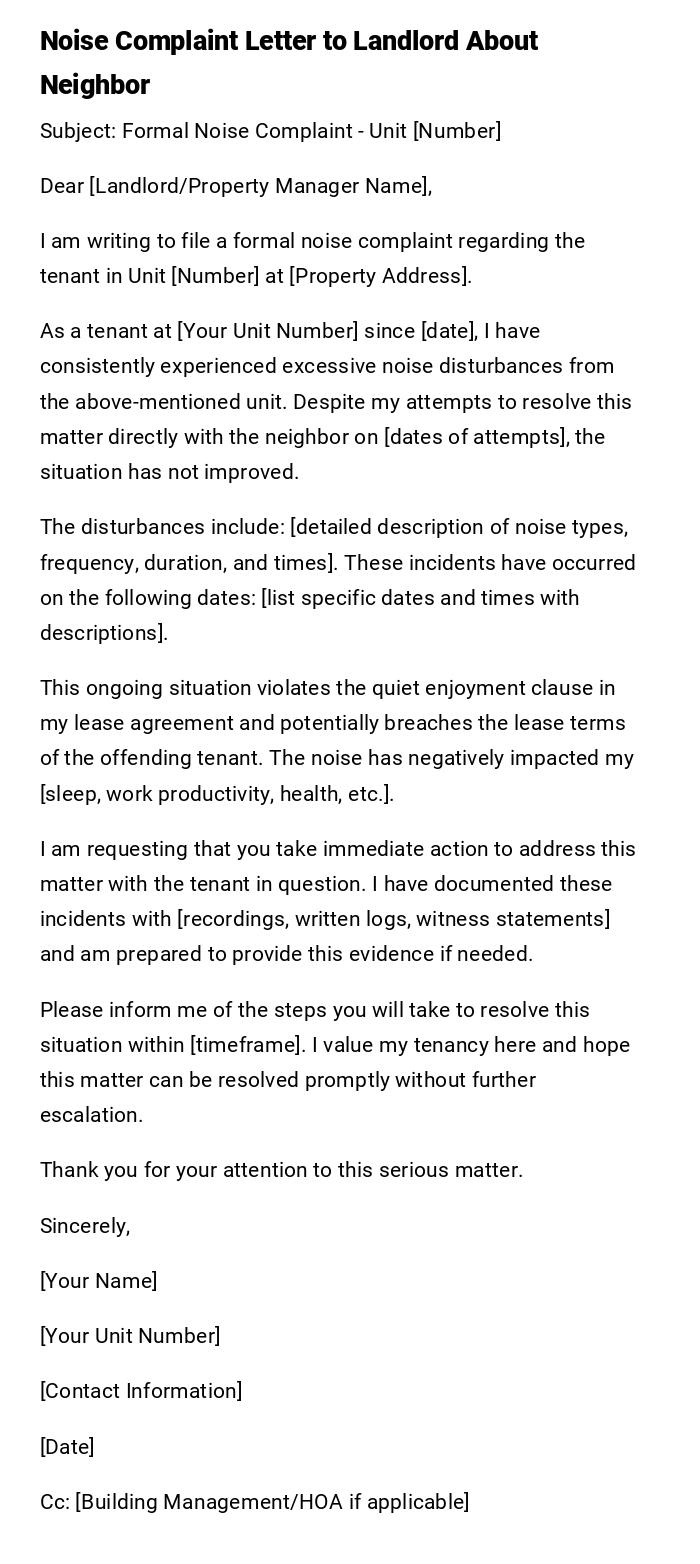
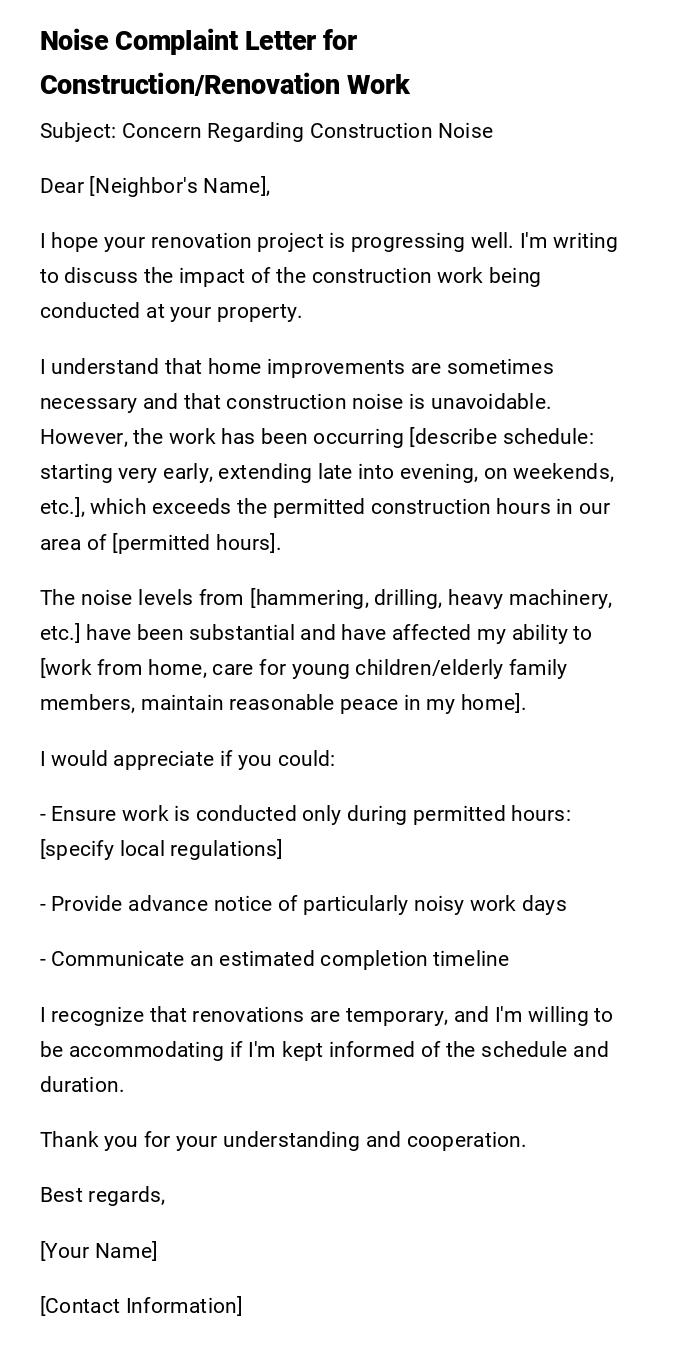
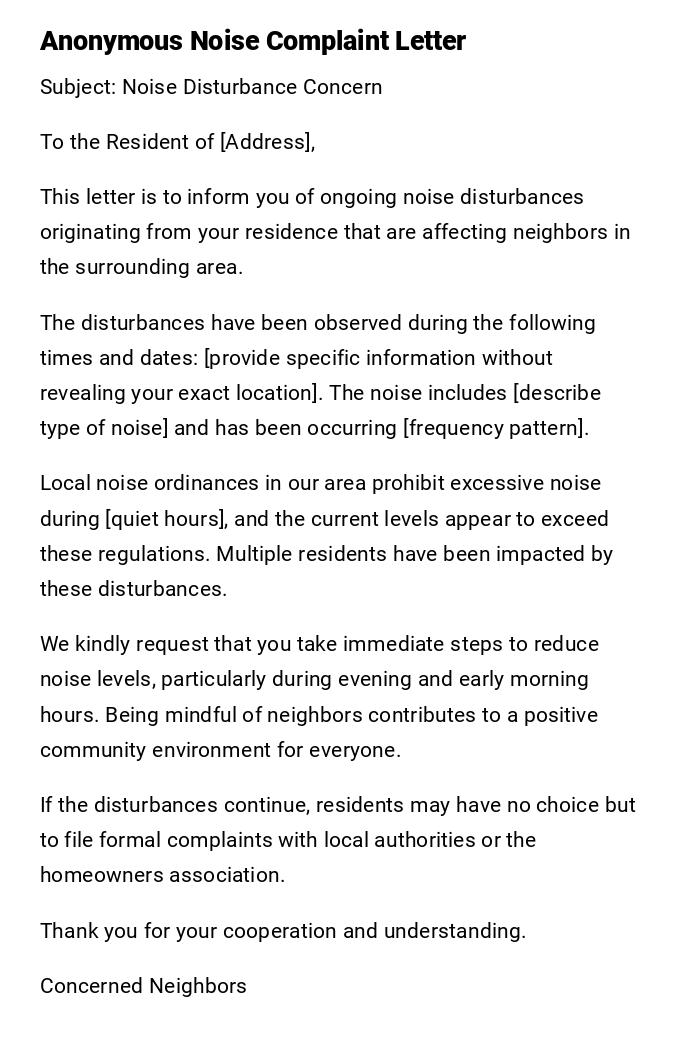

 Download Word Doc
Download Word Doc
 Download PDF
Download PDF